Is it in Europe, as they write about it?

Habré has a lot of articles related to life in Europe and relocation that can help people find the answer to the question “is it really worth moving to Europe?”.
The process of getting a job, getting a visa and finding a home is thoroughly described. There are articles both positive and not the most successful experience.
But just yesterday there was an article about Luxembourg and Europe, which caused quite a large response and touched on many controversial topics. And, let's say, not supported by any proofs, except the opinion of the author.
After reading this article, I wanted to write about some of the issues raised in it, not only in terms of the personal perception of the author, but also in terms of facts and figures.
Very brief introduction
- 1. I, unfortunately, do not work in IT, so the article is located in the hub of the Reading Room. I did not deserve an article in the hub of IT emigration.
- 2. Three years ago my wife and I moved to Germany, before that I had worked for a short time in Holland. He lived in Russia for a long time both in Moscow and not in Moscow.
- 3. My personal opinion will be expressed mainly on the experience of living in Germany.
So let's get started.
Sexual minorities in Europe. Statistics
According to Dalia statistics for 2016, based on a survey of 11,754 people in Europe, an average of 5.9% of Europeans belong to the LGBT community. At the top of the list is Germany, with a score of 7.4%. If you look from the point of view of the legislation, then according to the statistics of Rainbow Europe the most favorable conditions for the LGBT community in Malta, and the most unfavorable in Azerbaijan. In Europe, LGBT parades are held, namely Christopher street day. In different regions of Europe, this event is scheduled at different times. For example, in 2019 there will be 28 events , the first of which will be in May in Spain, and the last in August in Germany. Same-sex marriages are recognized in 28 countries of the world , 16 of which are located in Europe.
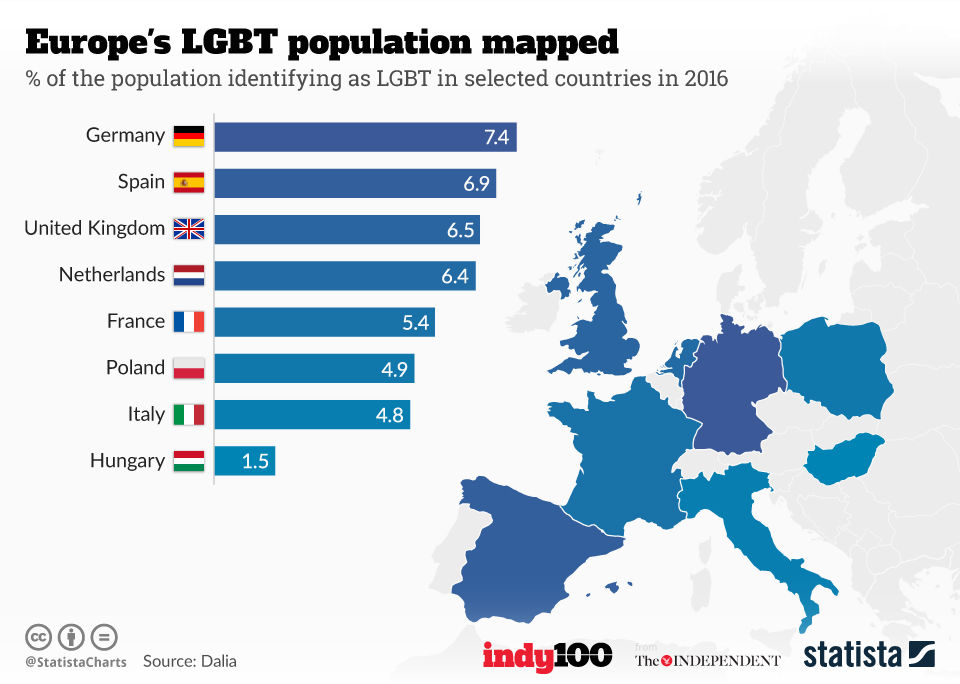
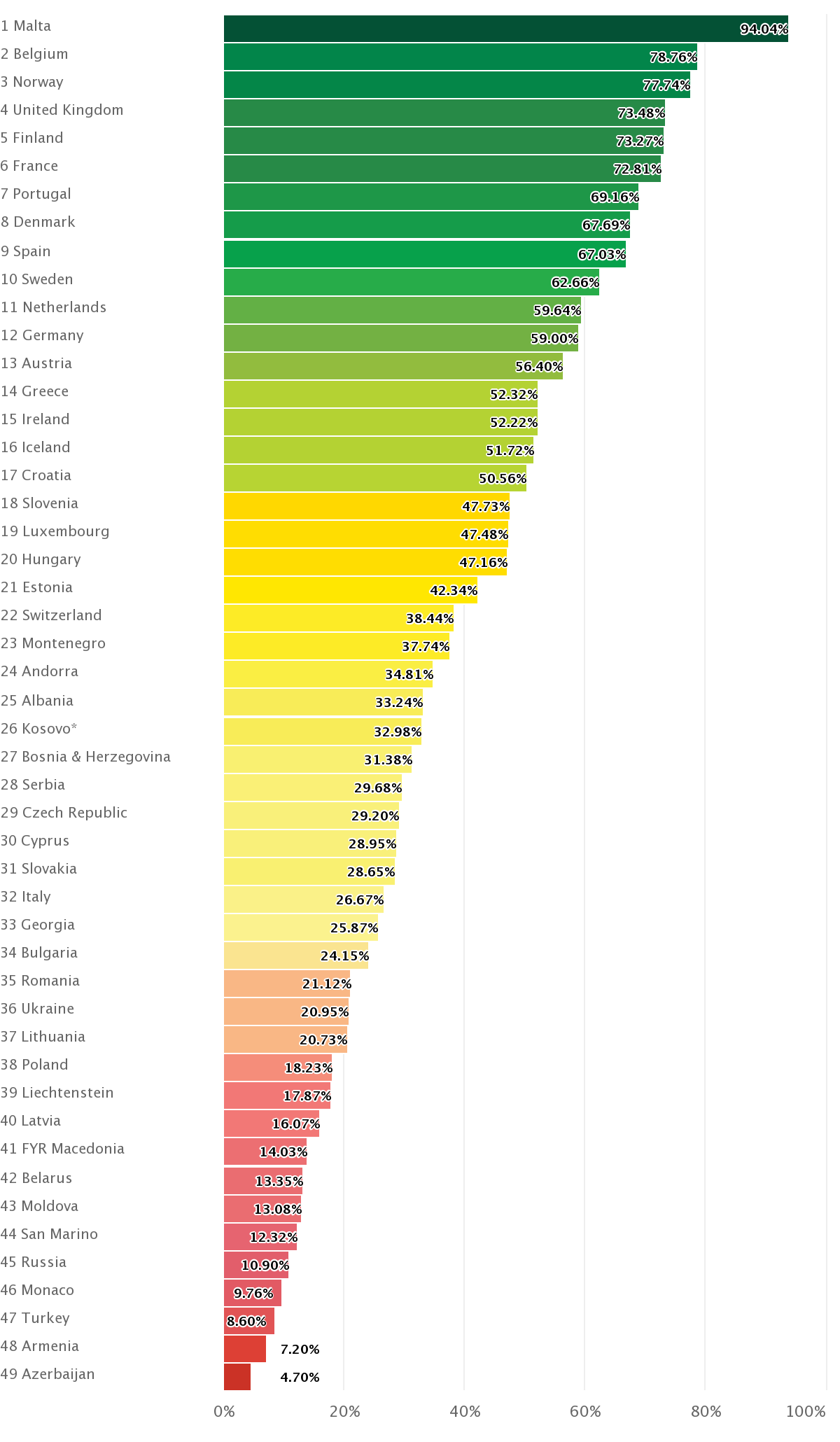
Sexual minorities in Europe. My opinion
In Germany, according to my feelings, sexual orientation is referred to as hair color. You can have any hair color, you can openly show it, you can hide it under a hat. This is your right and your decision. The rest by and large do not care. Visually, there are more homosexual couples in Germany than in Russia. But it is possible, because fewer homosexual couples in Russia show their relations in public.
In general, the LGBT topic in Europe is not something special or what they focus on. Perhaps, except once a year at Christopher street day.
Refugees and migrants. Statistics
According to Eurostat statistics, Germany is the leader in receiving refugees among European countries.
At the same time, the total number of accepted refugees in Europe reached a peak in 2015, and in 2017 it was reduced almost to the level of 2014.
Germany also leads in the number of people not born in the country.
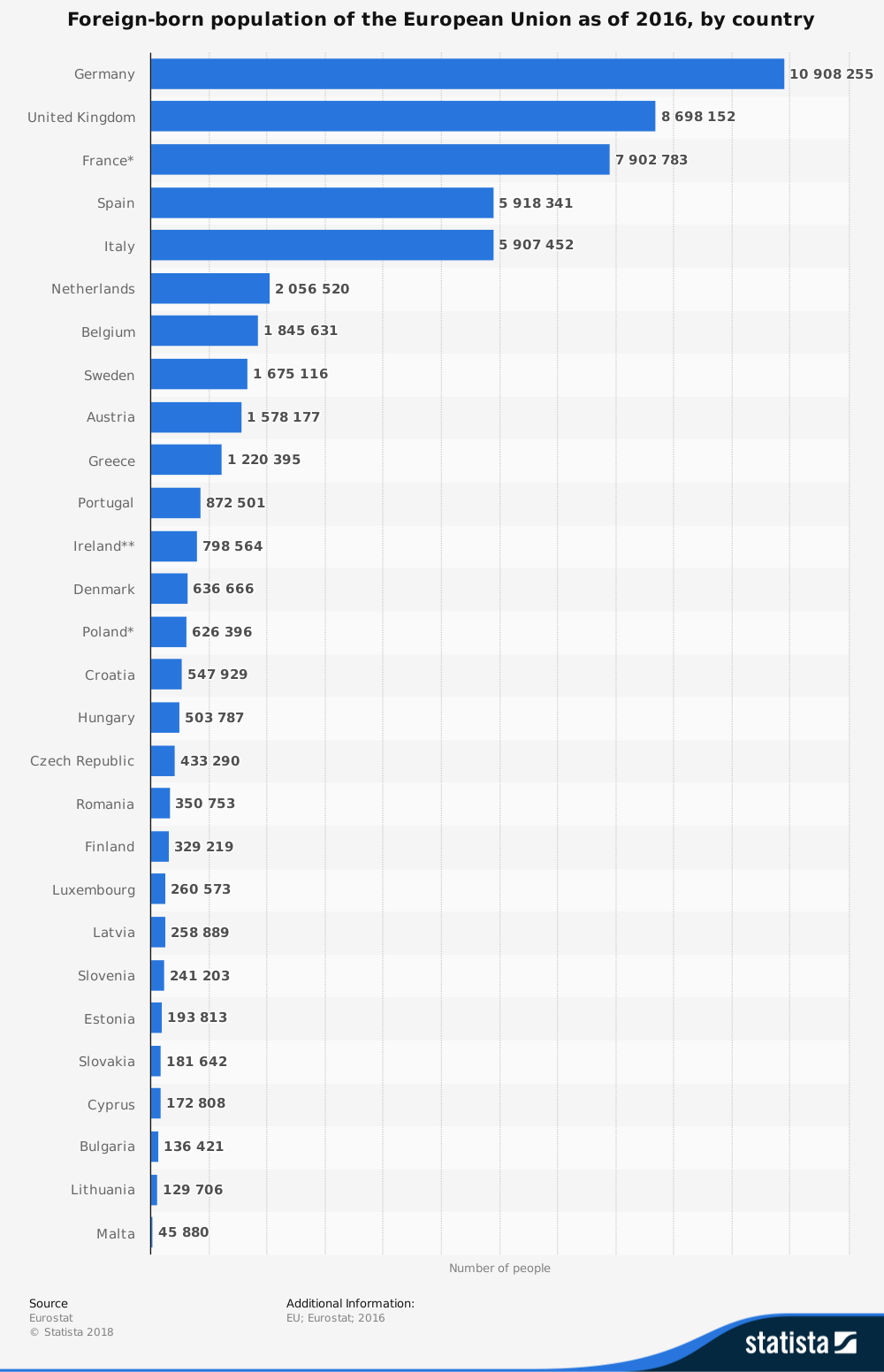
If we take illegal migrants in Europe, then according to Frontex statistics, the peak also fell in 2015.
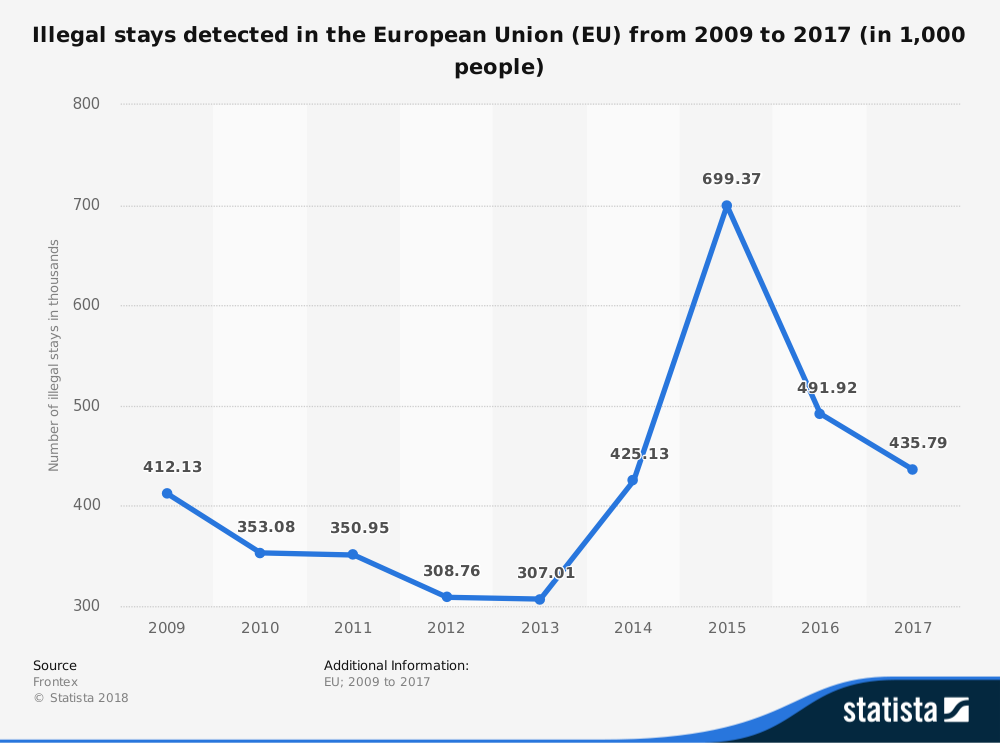
More detailed statistics on individual countries can be found on a special site .
Here, for example , from which countries the refugees tried to get to Germany in 2017.

Refugees and migrants. My opinion
Yes, in Europe, there are refugees. In Germany, compared with the German population, they are not so much visually, since refugees are first settled in special centers where the integration process begins.
But this, again, is my opinion. Perhaps in different cities different feelings.
In general, due to the fact that in Germany, in principle, there are a lot of “non-Germans”, the border between refugees and just foreigners is rather blurred.
Religion. Statistics
According to Eurostat in 2005, 18% of the EU population does not believe in God, 27% admit the existence of a supernatural "spiritual life force", while 52% believe in a specific (personal) God.
According to Eurobarometer statistics from the same Eurostat for 2010, Malta is the most religious country, and the Czech Republic is the most unbelieving.
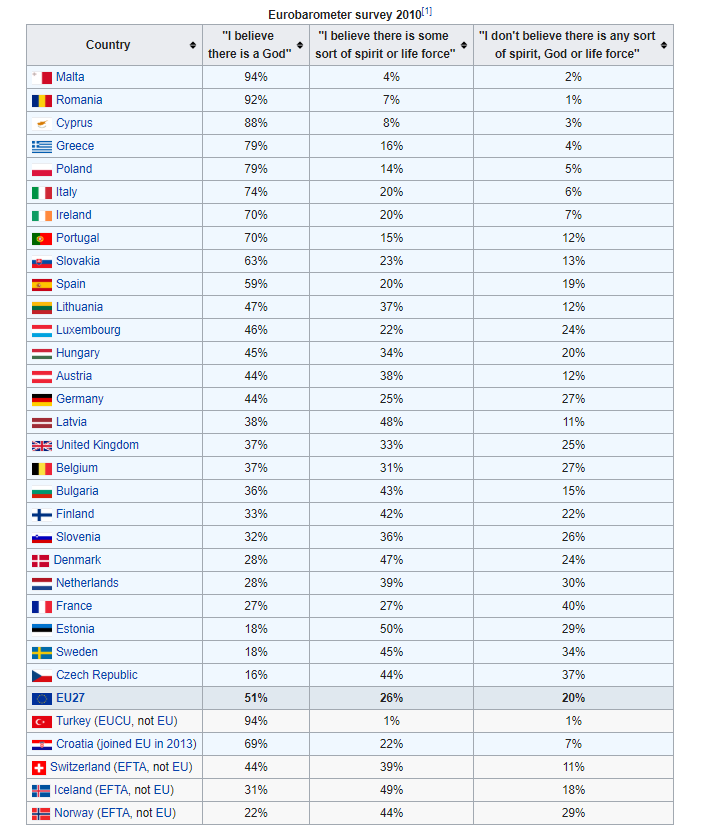
From the newer data, there is a study that the European Social Survey conducted in 2014–2016 in order to find out what percentage of the population aged 16–29 does not consider itself to belong to any religion.
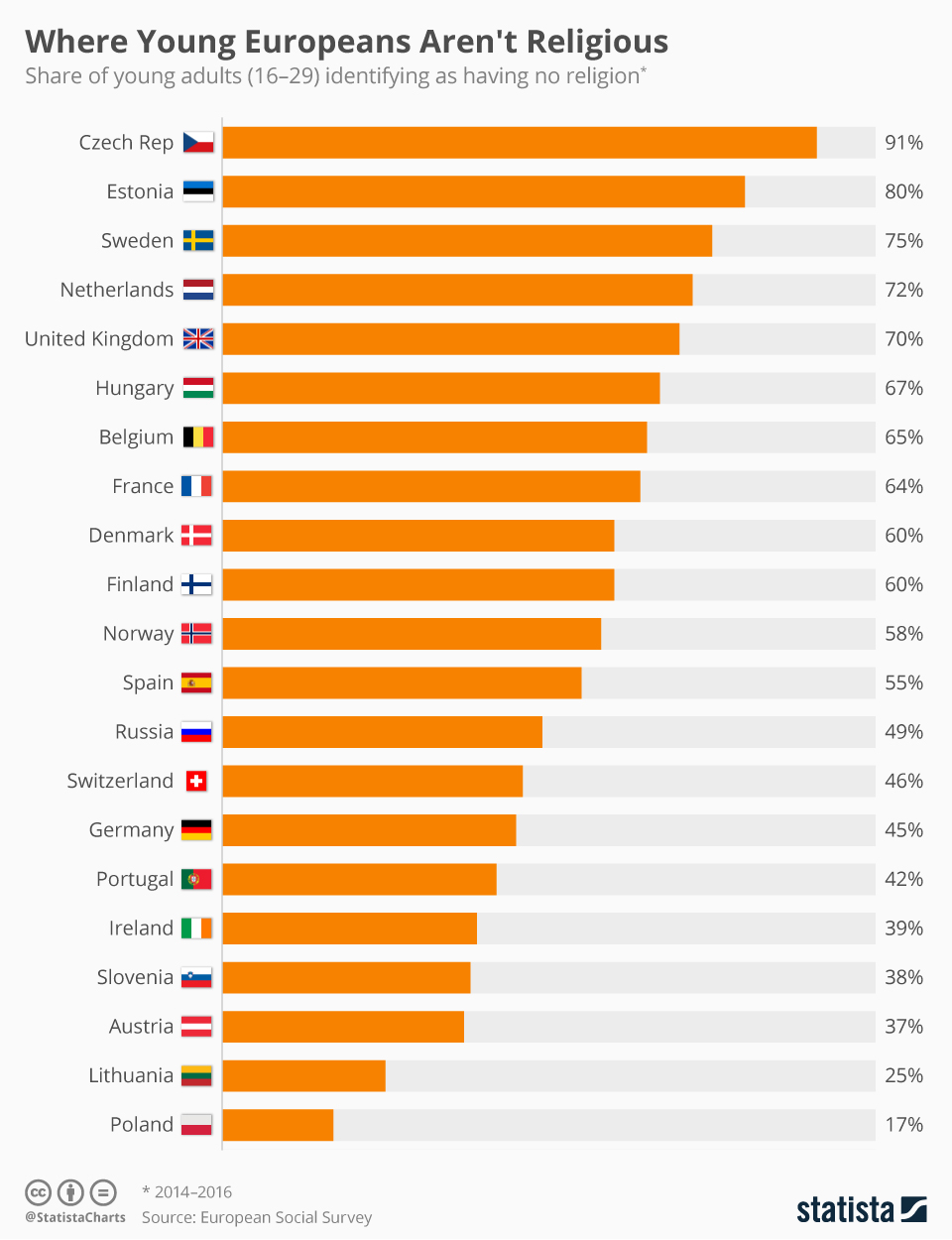
On the Wikipedia page, you can learn more about a particular religion and its prevalence in Europe.
Religion. My opinion
Here I can judge only in Germany. It feels like Germany is a rather religious country. A lot of churches / mosques / synagogues, a lot of holidays on Christian holidays, shops closed on Sundays. There is even a church tax that is deducted from your salary. But at the same time, if you are an atheist, you can refuse to pay it.
Churches are generally open to all interested tourists, regardless of their religion.
Prices and salaries. Statistics
The issue of prices, on the one hand, is quite difficult to analyze, since everyone has different lifestyles, and on the other, it is quite easy, because many companies have their own websites in Europe. That is, it is very easy to see the prices of their products in other countries.
However, for a rough comparison, you can use the site expatistan.com , which uses an interesting system for calculating the cost living ratio. You can compare the city in which you now live with the city to which you are going to move. Or a country with a country.
There is also a site numbeo.com , where, besides price comparison, you can look at health care, traffic jams and much more.
In addition to these two sites, there is Eurostat statistics. for some price groups: products, utilities, transport.
Prices and salaries. My opinion
Yes, on average, wages in Europe are higher than in Russia. But this does not mean that your income will be automatically higher. Before signing a contract with an employer, you need to examine how much you will pay taxes and social contributions, what is the average cost of renting housing in your city and what the situation is with the transport. Only then will you receive an overall objective picture of your income.
Prices in different countries are very different. In Germany, for example, everything related to human labor is very expensive. Whether it be shoe repair or furniture assembly. But home appliances, for example, are often cheaper than other European countries.
Conclusion
Moving to another country is definitely a lot of new interesting impressions and expansion of your horizons! But for the maximum smooth integration process in a new country, you need to be as ready as possible for this. Think not only about work and salary, but also about how people live in a new country and whether you will like it.
And trust the facts more than their absence!
